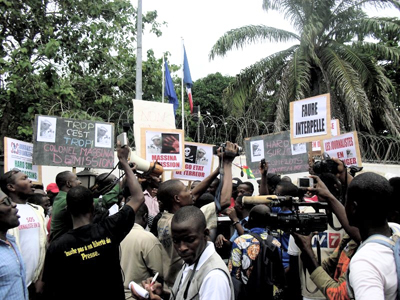Dozens of Togolese journalists marched in the capital, Lomé, on Saturday to call attention to reported allegations that government security agents planned to retaliate against critical reporters. The allegations themselves are in dispute–the government called them “fabricated”–but they are set against a recent U.N. report expressing concern over the official use of arbitrary detention and the alleged use of torture.
Police disrupted Saturday’s march and used tear gas to prevent the protesters from reaching the national assembly, according to local journalists. Protesters instead held a sit-in in front of the embassy of the French government, a close ally of the administration of President Faure Gnassingbé.
The protest is rooted in recent news reports, hotly disputed by the government, that National Intelligence Agency officials planned to target critical reporters for reprisal. At a July 25 press conference, members of the local press freedom group SOS Journalistes en Danger said they had received brown envelopes containing an undated, typed, and anonymous note from a person claiming to be an officer with the intelligence agency, known by its French acronym ANR. The note identified 10 prominent journalists who would be targeted because of their critical reporting on the government and the ANR. The note, whose contents were widely reported in the Togolese press, quoted a senior official as saying that the journalists were under surveillance and would “soon come to taste the torture they are talking about.”
In a statement, Minister of Security and Civil Protection Col. Dokisime Gnama Latta said the allegations in the note represented “an outrageous campaign” of “fantastic cock-and-bull stories,” according to news reports, and called the list of purportedly targeted journalists “fictitious.” Government officials met with representatives of Togo’s leading press unions–the Union of Independent Journalists of Togo (UJIT), the National Press Owners Committee, and the Togolese Media Observatory–to offer assurances that no journalists were in danger, UJIT Secretary General Crédo Tetteh said.
Local journalists acknowledge that the origin of the note is unknown, so there is plenty of reason to doubt its authenticity. But the allegations, true or not, tap into recent concerns about the ANR’s use of arbitrary arrests and extrajudicial detentions, practices the Human Rights Committee of the U.N. High Commissioner for Human Rights decried in a March report. The committee also said it was “concerned by allegations of torture and mistreatment in detention, notably at the premises of the ANR,” and deplored the state’s failure to investigate the allegations or define and criminalize torture along international standards.
Togolese news media have reported critically on the ANR’s handling of several high-profile detainees, including Kpatcha Gnassingbé, the president’s half-brother, who has been held indefinitely on accusations of involvement in an April 2009 coup attempt; and Sow Bertin Agba, a business tycoon mistreated in ANR custody after his March arrest on vague charges of fraud.
For now, the Togolese press unions have requested the National Human Rights Commission to launch an investigation into the alleged official retaliation against journalists so that “truth manifests itself,” Tetteh said.
